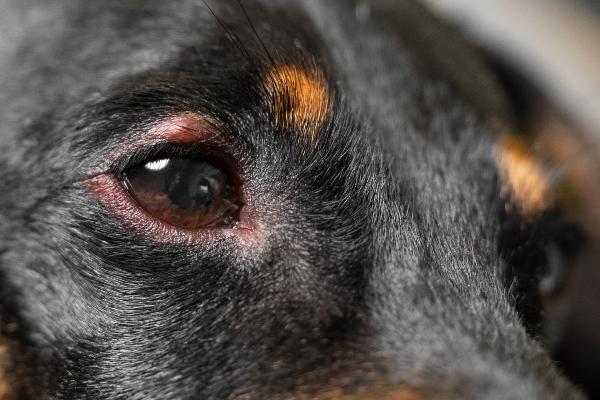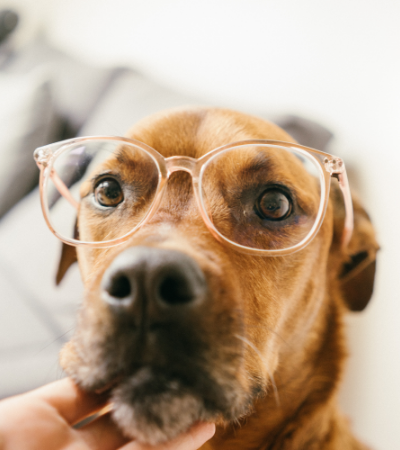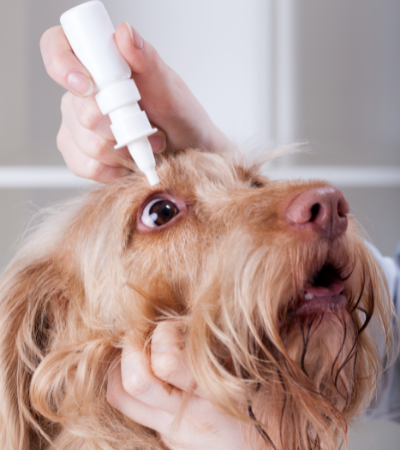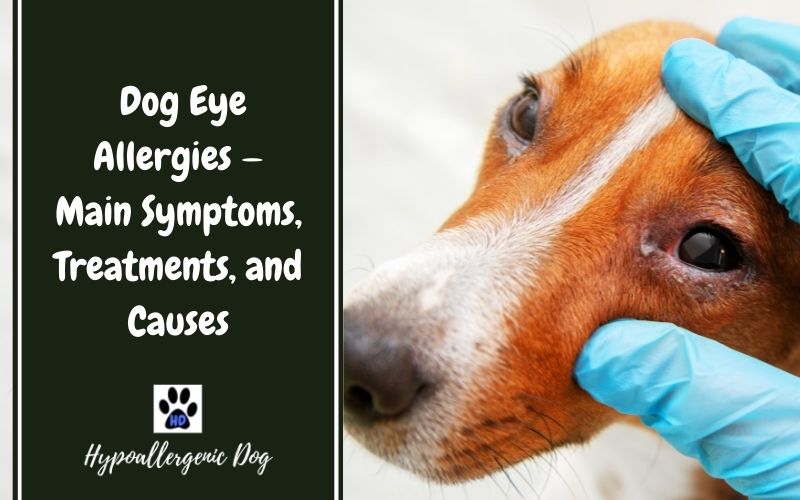If your pooch appears out of sorts, it’s a horrible situation for you both to be in, but have you considered what could be causing your dog eye allergies?
Being able to spot the initial problems can be tricky. The eyes are often confused with other medical issues. Yet, eye irritation due to allergies is surprisingly common in dogs.
Many factors can lead to eye allergies in dogs, and being able to identify the main cause can prevent these symptoms from reoccurring in the future.

Unfortunately, with any dog allergy, eyes will show reactions very quickly and will leave your pup highly uncomfortable and irritated. Several types of allergies are triggered by the body’s immune system having a misguided reaction.
Depending on the cause, the reaction your furry friend has will differ, but if you’re seeing symptoms such as dog eye discharge, allergies could be to blame. Let’s take a closer look at some of the most prevalent signs.
Redness
One of the most common symptoms reported by owners with dog allergies, red eyes is often an overlooked problem. Yet, it can be the initial sign to seek professional advice. This condition is also associated with other issues, such as glaucoma and conjunctivitis.
If you spot redness in your pup’s eyes, you should monitor them closely. Keep watch for any other symptoms that could mean their red eyes dog allergies require medical attention.
Swelling
A swollen eyelid, dog allergy manifests as a result of irritants such as dust, grass, or even soap and smoke. Not only can dog allergies lead to eyes swelling, but you may also spot puffiness in other areas of their face.
If you’ve noticed that dog allergy eyes are swollen, you must monitor their face, neck, and airways to ensure the swelling doesn’t spread further and cause serious implications.
Itching
Itching is one of the most recognized symptoms of any dog allergy. Eye itching is no different, with pawing at their face being a key indication that your furry friend is in discomfort. Frequent itching and irritation can often further aggravate many other symptoms, such as swelling, redness, and discharge.
Discharge
Healthy discharge from your dog’s eyes will be clear and watery. However, dog allergy eye discharge may appear colored or even milky.
Your vet may wish to rule out the possibility of other issues — for example, infection or ulcers, to determine if it is dog allergies eye discharge, or something related to their genetics and breed.
Yellow or green discharge alongside other dog eye allergy symptoms can be a sign that your pup has dog watery eyes allergies — allergic conjunctivitis.
Hair Loss
If you’ve noticed your dog losing hair around the eyes, an allergy may be to blame.
When your furry friend scratches their eyes to try and relieve the allergy-related irritation, this contact dermabrasion can lead to hair loss around their eyes.
What’s more, it could be permanent if not treated swiftly. Regular itching and irritation of these delicate hair follicles can result in permanent and irreversible damage. In short, your dog’s hair loss from allergies could be a lifelong problem if left untreated.

Allergies can be caused by a whole range of factors, and as the symptoms overlap, it can be tricky to diagnose the root cause of your pup’s discomfort. Here are the most common reasons behind eye allergies in pups.
Food
Food allergies result in an immune response, meaning that skin conditions such as swelling and itchiness are more likely to be present. Dietary sensitivities and intolerances can exacerbate itchiness and poor skin health. This can make dogs more susceptible to serious conditions, like skin infections and hair loss.
Your vet will offer you advice on how to treat the trigger in your dog’s diet. And, help you create a healthier meal plan to limit the allergies and eye problems your furry friend is experiencing.
Environmental Factors
Environmental allergens such as dust, pollen, and even mold can create a reaction in your pup. If these come into contact with their eyes, it’s no wonder they become red and itchy.
You may notice certain triggers are more frequent during specific seasons and times of the year. Take necessary steps to keep your pup well away from these. Consider the areas you take them on walks, and the times of day you choose to let them outside.
If your dog comes into contact with the environmental triggers, wash them thoroughly and remove any traces. It’s easy for your pup to scratch their face or body and spread the allergens further — leading to more discomfort and issues.

We’ve talked about the signs and the causes. Now let’s discuss how to treat dogs with eye allergies.
Dog Allergies Eyes Treatment
One of the most frequently asked questions is, can you use allergy eye drops on dogs? Natural saline eye drops are a safe way to try and flush out allergens from your dog’s eyes and prevent them from lingering and causing further irritation.
However, for more persistent allergies, a steroid-based solution could be prescribed by your vet. Antihistamines are another possible line of treatment. Again, this would involve a visit to your doggy doctor.
Although eye allergies are not life-threatening, the symptoms they produce can make your dog highly uncomfortable and miserable. This is why many pet owners opt to use natural DIY remedies to improve their pet’s condition and provide relief.
You can make your own saline solution for your dog’s eyes:
- Mix ¼ cup of warm water and ¼ teaspoon of salt.
- Dip a gauze pad into the solution and wipe from the corner outward, towards the ear.
Another option would be camomile tea bags:
- Brew the tea and leave to steep until the bag has cooled down.
- Take the bag and place it on your dog’s eye.
- Hold in place for around 5 minutes (if you can) at a time.
Cod liver oil also promotes optical healing, so you can apply these drops to your dog’s eyes to provide relief.
Bear in mind, these solutions may not treat the underlying causes of your dog’s eye infections. Hence, you should only use these at your vet’s discretion.
Dog Eye Allergies vs Infection
Dog eyes allergies are often confused with eye infections. While they can present themselves in similar ways, they can be individually diagnosed by your veterinary practice.
If using a saline solution, your dog eyes swollen allergies should improve within 48 hours. However, if your pooch has an eye infection, these drops may not be adequate to clear it. Your vet should be able to prescribe a suitable course of treatment to kill off the infection and alleviate the symptoms.

Conclusion
An eye allergy in dogs is caused by any number of potential irritants — from seasonal pollen and household dust through to the food in their dinner bowl. The only real cure is to prevent contact with the offending allergen.
Typical signs include watery or red eyes, continual itching, and even swelling or hair loss around the head.
If you’re unsure of the reason behind your pooch’s predicament, your vet can carry out tests to diagnose the underlying problems. So, you can prevent prolonged exposure to their triggers.
And, while dog eye allergies are highly common and manifest similar symptoms to other conditions — as we’ve seen, you can treat it at home or via a trip to the vets.
What Eye Drops Can I Give My Dog for Allergies?
Your dog may benefit from antibiotic eye drops containing ciprofloxacin (Ciloxan), or steroid eye drops to treat infections and allergies. Both of these will require a trip to your vets for a prescription.
Can You Buy Antibiotic Eye Drops for Dogs Over the Counter?
Most effective treatments for dog eye allergies and infections will require a prescription. That said, you can purchase some over the counter, but you should check with your vet to ensure if it’s the most appropriate treatment.
Can I Use Human Eye Drops on My Dog?
Medications designed for human use will have an entirely different set of safety rules and regulations. This means the ingredients used may not be safe for use on canines. In some cases, these products can cause pain and blindness in your dog. Consult your vet first.
How Do You Make Saline Eye Wash for Dogs?
Mixing ¼ teaspoon of sea salt with 1 cup of clean water at room temperature makes the perfect saline eyewash for your dog. Apply it via a plastic dropper or by holding a soaked cotton ball or gauze over their eye to flush out the irritation.
Can I Use Allergy Eye Drops on My Dog?
Human-use eye drops could be harmful to your pooch. For one, while the potency level is safe for humans, it may be too high for canines. Plus, it also depends on your tail-wagger’s medical history. Ask your vet for advice on what products are safe to use on your pet.


